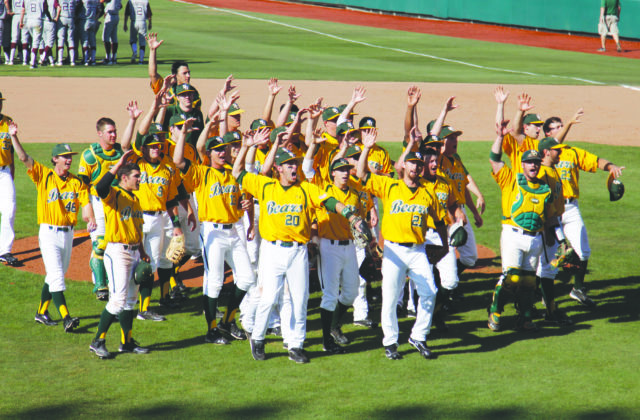By DJ Ramirez | Sports Editor
On March 24, 2012, during a Saturday afternoon game against Kansas, Baylor baseball was looking to claim the series after a 10-2 win the previous night. The Bears had scored a run in the second inning to take an early 1-0 lead. In the third, with first baseman Max Muncy at the plate, sophomore pitcher Josh Michalec called out to the future LA Dodger the chant that would define the 2012 baseball season.
“Feed the Beaver!”
Muncy blasted that ball into the Brazos River, breaking a 15-game home run drought.
Beaver Magic
It was mid-March 2012, and the Baylor baseball team had just returned to Waco following a tough loss to UT Arlington. After holding a 4-2 lead through six scoreless innings, a botched double play allowed the Mustangs to plate three in the top of the ninth, handing the Bears their seventh loss of what would become a historic season for Baylor.
Assistant coach Steve “Hoot” Johnigan and one of the team’s volunteer coaches were preparing the field for the next day’s practice when then-senior pitcher Joey Hainsfurther called them over to the parking lot. There, under one of the big oak trees by the river sat a large beaver, minding its own business, eating some acorns.
“I mean, it was big, and they’re just mesmerized by it,” Johnigan said. “And it wasn’t running from us. And next thing I know, they got a leash on that thing. They’re walking it around the parking lot.”
That Tuesday night was just the start of what would spark a phenomenal run for the Bears. After the loss to the Mustangs, Baylor kicked off a new 24-game win streak, sweeping its first six conference series along the way.
“The ‘Feed the Beaver’ thing kind of took off,” Johnigan said. “Nobody planned that. It just kind of happened; and when it did, next thing you know, we got T-shirts printed and got signs. We even get a guy that’s dressed up as a beaver. It worked right then, and then people kept yelling it and we kept producing. Then it just kept spiraling, and there really was a beaver… it was just crazy.”
But the magic of the Beaver would eventually run out. Baylor would miss the boat to Omaha and the College World Series due to two heartbreaking losses to Arkansas in the Waco Regional in early June.
A Surprising Farewell
When thinking about Baylor baseball in the past decade, the 2012 season is a standout year, not just because of the wild success the team experienced that year, but also because it marked the beginning of the end of the Steve Smith era.
Smith, who took over for Mickey Sullivan in 1994, built up an impressive resume as the head coach of Baylor’s baseball team. In 21 years of coaching the Bears, Smith led the program to 13 NCAA Regional appearances, four Super Regional appearances and one College World Series in 2005. As the most tenured coach in the Big 12, he also has the most wins out of any Baylor coach in any of the university’s 19 programs.
Johnigan, who worked as one of Smith’s assistant coaches throughout his entire Baylor career and now serves Baylor Athletics’ director of event management and facilities, said Smith was a stellar head coach because of the humility he has as a person.
“Deep down inside he is as good a guy as there ever is,” Johnigan said. “Sometimes it’s hard for that to come out and show, but the guy was humble. The guy was genuine; and he wanted to win. His philosophy was, ‘I’m going to win on the field without compromising our character or our integrity,’ and he did that, and he lived that out to a tee.”
According to Johnigan, Baylor baseball, no matter who’s in charge, has made it its mission to develop the man and the student, as well as, the player. The Bears have worked hard toward that goal, having produced the most academic honors in the Big 12 conference.
In Johnigan’s words, Smith wanted his players to have “every opportunity to grow” on and off the field.
“Some people just want to do it on the field,” Johnigan said. “It’s all I’m worried about because that does keep your job. But [Smith] was about more than that —it’s about relationships. It’s about helping these kids develop. And if we make a mistake on recruiting, we’re going to live with it. We’re going to make them better.”
A perfect example of that philosophy was former Baylor catcher Josh Ludy. As a freshman in 2009, Ludy was not ready to be a starter; and having not had the best year on the field, the coaching staff had to convince him to stay at Baylor. But it paid off as the slugger finished his collegiate career in 2012 as the Big 12 Player of the Year and was drafted by the Phillies in the eighth round of that year’s draft.
But after that outstanding 2012 season, the Bears went through a three-year postseason drought; and in 2015, after building up the program the way he did, Smith was let go.
“I think he was a little surprised,” Johnigan said of Smith’s firing. “That’s the business; we get it. And it’s hard to take sometimes, but it is. You got to win to keep your job; and three years, I guess, not making the NCAA was enough to cost him his.”
Smith moved on to become the volunteer pitching coach at the University of Auburn, and Baylor had to find someone new to take over the program.
A Little California Sunshine on the Banks of the Brazos
A lot of Texas-based names were tossed around, but ultimately, the Bears found their new head coach in Pepperdine’s Steve Rodriguez, who had been at the helm for the Waves’ since 2003. Rodriguez told the Lariat in an email Q&A that he was excited when he got the offer to come to Waco and lead a “storied program.”
“Baylor and Waco have been a great fit for me and my family,” Rodriguez said.
The first year of the Rodriguez era was a transition year for the Bears, as it always is when there’s a change in leadership; but by 2017, Baylor was back to winning and back in a regional.
Under Rodriguez in 2017, the Bears produced their first All-American closer since 2012 in Troy Montemayor, their first freshman All-American in Shea Langeliers and the program’s first ever Big 12 Scholar-Athlete of the Year in outfielder Richard Cunningham.
In 2018, Baylor once again made a regional appearance after grabbing its first ever Big 12 Championship Tournament title, in which Langeliers and then-sophomore pitcher Cody Bradford received the tournament’s Co-MVP award.
A year later, the Bears made their third NCAA regional under Rodriguez and produced six MLB draft picks, including two first-rounders in Langeliers and third baseman Davis Wendzel.
Johnigan said Rodriguez has done a good job at handling the program and developing some very talented players both on and off the field.
“He’s got a lot of talent. He’s got a lot of good players,” Johnigan said. “With Langeliers last year, I mean holy cow, Davis Wendzel – those guys were outstanding. And he’s got some of the less profile guys like Josh Bissonette who was just scrappy.”
With the direction that Baylor’s athletic program has been taking, Baylor baseball has stuck to its mission of success both on and off the diamond. With 19 new players for the 2020 season and a veteran group that’s established it can face adversity and win, Rodriguez only sees improvement for his team.
“I have had great support from our administration, and the student athletes we have here at Baylor are a special bunch,” Rodriguez said. “They have bought into our way of doing things and have been the real catalyst for our improvement over the last four seasons. The sky is the limit for this program as we continue to develop our student athletes both on and off the field and prepare champions for life.”



